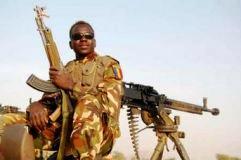Chad rebels to fight on despite Darfur peace deal
May 12, 2006 (DAKAR) — A peace deal to end the conflict in Sudan’s Darfur region will not halt a campaign by rebels in neighbouring Chad to topple President Idriss Deby, a Chadian rebel spokesman said on Friday.
 Sudan’s government signed a peace deal last week with the main Darfur rebel group to end three years of fighting that has killed tens of thousands of people and forced 2 million from their homes in the western Sudanese region, which borders Chad.
Sudan’s government signed a peace deal last week with the main Darfur rebel group to end three years of fighting that has killed tens of thousands of people and forced 2 million from their homes in the western Sudanese region, which borders Chad.
Rebels in Chad bent on ousting Deby have stepped up attacks since last year and raided the capital N’Djamena three weeks before a May 3 election that is almost certain to have re-elected the president. Results are due this weekend.
Albissaty Saleh Allazam, spokesman for the Chadian rebel United Front for Democratic Change (FUC), told Reuters while his group applauded the Darfur peace deal, it would not affect FUC’s own fight to end Deby’s nearly 16-year rule in Chad.
“We’re happy for our Sudanese brothers … but we’re going to deal with our own problems in Chad,” he said, speaking via a satellite phone.
“This doesn’t affect our struggle, as Chadians,” he added. Allazam did not say where he was speaking from but has previously given his location as eastern Chad.
Deby has accused neighbour Sudan of backing and arming the FUC rebels, a charge denied by Khartoum.
While the peace deal for Darfur raises hopes of relief for thousands of displaced civilians living in camps there, United Nations officials are worried about deteriorating security in Chad, where more than 200,000 Sudanese refugees are sheltering.
U.N. humanitarian chief Jan Egeland met Deby on Thursday to discuss conditions in eastern Chad, where armed raiders have attacked villages and threatened humanitarian workers.
The United Nations wants to strengthen and take over an existing African Union peacekeeping force in Darfur.
One Chad-based U.N. official, Kingsley Amaning, said in N’Djamena on Thursday one of the options being considered was for another international force in Chad to protect civilians and refugees there. But he gave no further details and U.N. officials in New York said there were no plans for a Chad force.
FUC’s Allazam said Chad’s rebels were not concerned about a U.N. peacekeeping mission in Darfur. But they would oppose such a force for Chad, because it could help to prop up Deby.
“We don’t need a U.N. force in Chad,” he said.
JOIN FORCES
The FUC rebels, who accuse former colonial power France of using a French military contingent stationed in Chad to keep Deby in power, are demanding his government agree to negotiate a transition to new elections.
They say his rule has become increasingly corrupt, dictatorial and clan-based, although his grip on power has been weakened by high-level defections, including members of his own Zaghawa ethnic group which lives in both Chad and Sudan.
The rebels and Chad’s political opposition have dismissed as a one-sided farce last week’s presidential poll, which saw a low voter turnout and was boycotted by the main opposition parties.
“Deby rushed into the elections so he could legitimise himself. He doesn’t want to leave power, so it’s not going to work,” Allazam said.
Asked about the lack of fresh military operations by the rebels since they raided N’Djamena on April 13, he said FUC was working to forge unity with other anti-Deby rebel groups.
Often reflecting Chad’s multiple ethnic strains, the rebel organisations have been hit by rivalry and infighting.
“What we need is everyone to arrive in N’Djamena together,” Allazam said.
(Reuters)
